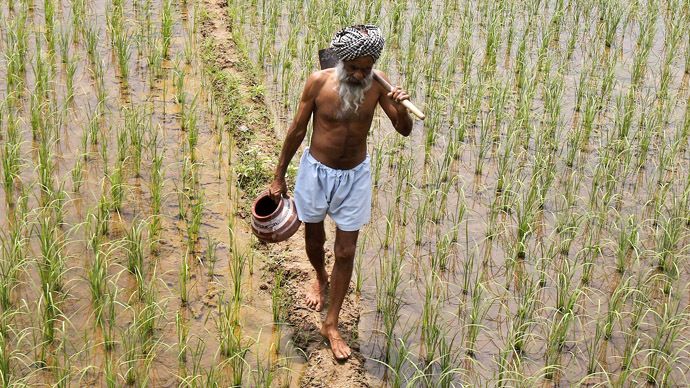India has banned companies such as Monsanto from conducting GMO seed trials on their land, saying that the risks to public health and the environment are too high.
Bihar’s Agriculture Minister, Narendra Kumar Singh, confirmed that India’s food supply will be protected from GMO companies growing genetically modified corn on Indian land and assured the public that seeds will be protected from contamination from genetic material drift.
Naturalnews.com reports:
His speech was given at the 2014 Seed Festival at the A N Sinha Institute of Social Studies. The Seed Festival featured over 500 different varieties of crop seed. The inaugural event featured agriculture experts from Bihar, Chhattisgarh and Kerala who represent a growing movement against genetically modified crops in India.
Singh spoke out about protecting non-GM seed crops: “Seed is the basic unit of input and is the lifeline of agriculture. Attempts are being made by multinational companies to replace our traditional seeds with GM seeds, which would be dangerous for environment and health.”
Singh was joined by those with direct field experience, including farmers’ commission chairman C P Sinha, Harit Swaraj convener Vijay Pratap, Jacob Nilethan, an expert from the Asha Alliance, and seed savers.
Singh announced that Bihar was the first state in the world to halt field tests of genetically modified seed for the larger humanitarian interests of farmers and society at large.
Farmers seeking seed sovereignty, diversity
For the farmers, it’s all about seed sovereignty. Saroj, a leader of Paschim Odisha Krushak Sangathan, stated, “Seed sovereignty is not a baseless ideological position, but a pragmatic approach. It is an integral part of food security and sovereignty of a community or a nation. Seed being handed over to multinational corporations, many of them notorious for their monopolistic tendencies and operations, is disastrous for the livelihood of millions.”
Saroj believes in sustainable, holistic agriculture and the right of all farmers to be sovereign and independent, uncontrolled by monolithic seed imperialists. He assembled with about 400 other farmers who traveled from Andhra Pradesh, Madhya Pradesh, Uttar Pradesh, Chhattisgarh, Assam, Jharkhand and Karnataka to formulate a plan for protecting their liberty going forward, while preserving traditional seed varieties in the country. Saroj believes that the Indian state government should help protect indigenous seeds from being overrun by faraway corporations who contaminate and control agricultural production.
“Government should encourage, and invest in farmer-level seed production of locally suitable, diverse seeds. Community seed banks should be set up with schematic government investment,” he said. The group believes that “seed breeding should be in organic conditions” because they do not want seeds to “become a package that brings in other unwanted inputs like chemicals.”

